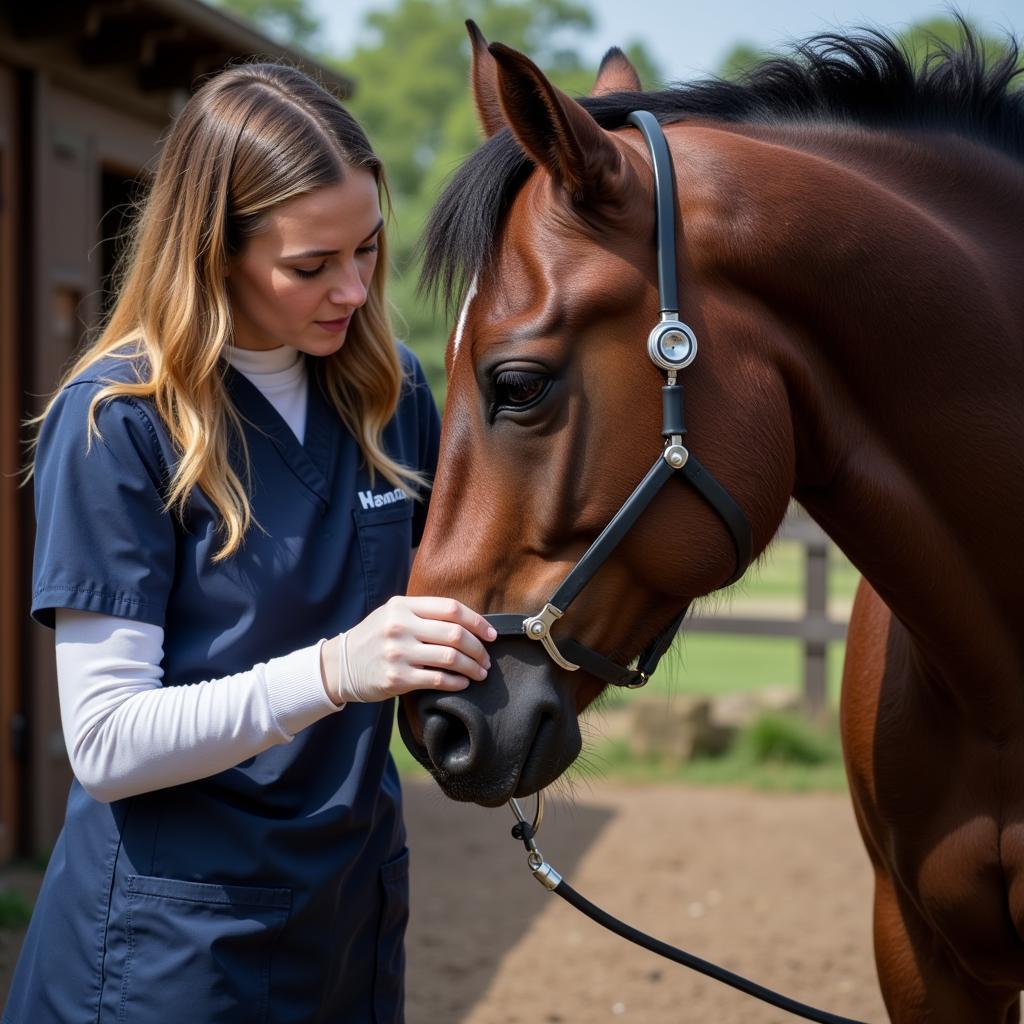Pouring a horse, a term often used to describe a horse sweating profusely, is a crucial indicator of its overall health and well-being. Understanding what causes a horse to “pour,” and how to respond appropriately, is essential for every horse owner. This article will delve into the various reasons why a horse might sweat excessively, from strenuous exercise to underlying health issues.
A horse’s ability to sweat is vital for thermoregulation, allowing it to cool down during physical activity or in hot weather. However, excessive sweating, or “pouring,” can sometimes signal a more serious problem. Knowing the difference between normal sweating and a cause for concern is crucial for providing proper care. For instance, you might need a rain sheet horse in certain weather conditions to help regulate their temperature.
Why is My Horse Pouring Sweat?
Several factors can contribute to a horse sweating excessively. Let’s explore some of the most common reasons:
-
Strenuous Exercise: Just like humans, horses sweat to regulate their body temperature during exercise. A horse “pouring” sweat after a hard workout is usually perfectly normal, especially in hot and humid conditions.
-
Heat Stress: When the ambient temperature exceeds a horse’s ability to cool itself efficiently, it can lead to heat stress and profuse sweating. This is particularly common in hot, humid climates. Providing adequate shade and water is vital in these situations.
-
Anxiety and Stress: Horses can also sweat excessively due to anxiety or stress. New surroundings, transportation, or even changes in routine can trigger this response.
-
Pain: Pain can also cause a horse to sweat profusely. This can be due to colic, lameness, or other underlying medical conditions. If your horse is sweating excessively and showing signs of discomfort, it’s important to contact a veterinarian immediately.
-
Dehydration: Ironically, dehydration can also cause excessive sweating. When a horse is dehydrated, its body struggles to regulate its temperature effectively, leading to increased sweating. Always ensure your horse has access to fresh, clean water.
Decoding the Sweat: What to Look For
The characteristics of the sweat itself can offer clues about the underlying cause. For example:
-
Location of Sweat: Localized sweating, particularly in specific areas of the body, might indicate pain or a localized issue. Generalized sweating, on the other hand, is more common with exertion or heat stress.
-
Quality of Sweat: Thick, sticky sweat might suggest dehydration or an electrolyte imbalance. You may want to consider a tick prevention for horses especially during warmer months.
-
Accompanying Symptoms: Observe your horse for other symptoms, such as rapid breathing, elevated heart rate, or changes in behavior. These can provide valuable information for your veterinarian.
When to Call the Vet
While some sweating is normal, excessive or unusual sweating warrants veterinary attention. Contact your vet if your horse:
-
Is sweating profusely without any obvious cause.
-
Is exhibiting other signs of illness or distress, such as colic symptoms, lameness, or lethargy.
-
Has thick, sticky sweat, which could indicate dehydration.
“A horse pouring sweat without any apparent reason is a red flag,” says Dr. Emily Carter, DVM. “It’s always better to err on the side of caution and have your veterinarian assess the situation.”
 Veterinarian Examining Sweaty Horse
Veterinarian Examining Sweaty Horse
Preventing Excessive Sweating
While some causes of excessive sweating, such as illness or pain, require veterinary intervention, there are steps you can take to minimize the risk:
-
Provide Ample Water: Ensure your horse has access to fresh, clean water at all times, especially during hot weather or after exercise.
-
Electrolyte Supplementation: Electrolytes can help replace essential minerals lost through sweating. Consider adding an electrolyte supplement to your horse’s diet, especially during periods of intense exercise or heat stress. If you are looking for appropriate attire during horse riding, consider a horse riding jacket.
-
Manage Stress: Minimize stressful situations for your horse whenever possible. Provide a calm and consistent environment, and introduce changes gradually.
-
Monitor Exercise Intensity: Adjust your horse’s workload according to the weather conditions and its fitness level. Avoid strenuous exercise during the hottest parts of the day. A horse rain sheet with neck can also be helpful.
“Proper hydration and electrolyte management are crucial for preventing excessive sweating,” advises renowned equine nutritionist Sarah Miller. “A balanced diet and appropriate exercise regimen are also essential for maintaining a horse’s overall health and well-being.”
In conclusion, understanding why a horse might “pour” sweat is essential for responsible horse ownership. By recognizing the various causes and knowing when to seek veterinary attention, you can ensure your horse’s health and comfort. Remember, appropriate management and proactive care are key to preventing excessive sweating and maintaining your horse’s well-being. Tick repellent for horses is also important, you can check tick repellent horses.
FAQ
- What is “pouring” in a horse?
- Is it normal for a horse to sweat after exercise?
- When should I be concerned about my horse’s sweating?
- What can I do to prevent my horse from sweating excessively?
- How can I tell if my horse is dehydrated?
- What are the signs of heat stress in horses?
- Can anxiety cause a horse to sweat?
For assistance, contact us at Phone Number: 0772127271, Email: [email protected] or visit us at QGM2+WX2, Vị Trung, Vị Thuỷ, Hậu Giang, Việt Nam. We have a 24/7 customer service team.